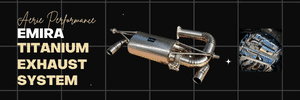Since taking delivery of my Lotus Emira, it has been a thrilling companion on winding mountain roads and two track days at Lihpao International Circuit. While the car’s performance is undeniably engaging, my ownership experience hasn’t been entirely trouble-free. During the initial 1,500-kilometre running-in period, I encountered the engine warning light twice after spirited mountain drives. Through careful analysis and testing, I’ve pinpointed a specific issue linked to early upshifts under full throttle, and I’m sharing the insights and adjustments I’ve discovered to address it.
The Quirk: Warning Light on Mountain Roads but Not on the Track
The first warning light appeared after a spirited mountain drive. Using an OBD2 scanner, I identified errors associated with the exhaust valve and OPF (particulate filter). During the 1,500-kilometre service, the dealership reset the errors, and I didn’t think much of it. I then took the car to Lihpao for a track day, where I pushed the car hard, hitting redline in almost every gear.Curiously, the warning light never appeared after these intense track sessions. However, after returning to mountain roads and engaging in spirited driving, the light reappeared. This led me to suspect that driving conditions and techniques specific to mountain roads were triggering the issue.
Core Analysis: Why Early Full-Throttle Shifts Cause the Warning Light
The Lotus Emira is equipped with a Mercedes-AMG M139 turbocharged engine, renowned for its robust performance. However, its tightly calibrated engine management system appears to be highly sensitive, especially under certain driving conditions. The car’s DPM (Dynamic Performance Management) system, which governs various driving modes, plays a crucial role in the issue.In SPORT and TRACK modes, the exhaust valve is programmed to remain fully open above 3,000 rpm, enhancing the car’s exhaust note and responsiveness. However, if engine speed falls below 3,000 rpm during gear changes, the valve automatically closes to reduce noise and emissions.
When driving on mountain roads, I often adopt an early upshift strategy under full throttle to maintain traction on slippery surfaces or navigate tighter corners. For example, shifting from third to fourth gear earlier than usual helps prevent wheelspin. However, this technique can drop engine speed to just below 3,000 rpm during the shift, causing the exhaust valve to momentarily close and then reopen as the revs recover.
This rapid opening and closing of the exhaust valve under high throttle creates sudden fluctuations in exhaust pressure. The ECU, detecting these abnormal pressure waves, interprets them as a potential fault and triggers the engine warning light.
On the track, the situation is different. Gear shifts occur at much higher revs, typically keeping the engine well above 3,000 rpm. As a result, the exhaust valve remains fully open throughout, avoiding the rapid valve transitions that occur during early shifts on mountain roads.
Observations from the Exhaust Note and Vibration
In my mountain driving sessions, I began to notice a pattern. During early upshifts under full throttle, I often heard a distinct “pop” from the left exhaust pipe, followed by a slight vibration through the chassis. These instances were consistent with when the warning light later illuminated.This popping sound and vibration, I believe, are linked to the sudden changes in exhaust pressure caused by the exhaust valve transitioning between open and closed states. On the track, where gear shifts are delayed and revs remain high, this phenomenon does not occur, and the warning light never appears.
Adjustments: Mitigating the Fault Through Driving Techniques
To address this issue, I’ve experimented with two driving adjustments that significantly reduce the likelihood of triggering the warning light:- Lift-Off Slightly During Gear Changes
When shifting up during full-throttle acceleration, briefly easing off the throttle can smoothen exhaust pressure changes. This reduces the impact of valve transitions and helps prevent fault signals. - Shift Earlier and Use Torque for Acceleration
Instead of pushing to higher revs before shifting, consider upshifting earlier and allowing the engine’s strong turbocharged torque to power the car smoothly through corners. For example, shifting from third to fourth gear earlier can avoid the abrupt drop in revs that causes the exhaust valve to close and reopen. While this approach might slightly compromise acceleration sharpness, it provides a more stable and consistent experience, especially in wet or low-grip conditions.
Conclusion: Embracing the Emira’s Unique Character
The Lotus Emira is a car with character, blending extraordinary performance with a few quirks that demand attention and understanding. While the engine warning light can be an annoyance, it’s often not indicative of a serious issue. Instead, it reflects the highly sensitive nature of the car’s electronic systems.By making slight adjustments to driving techniques, such as easing off the throttle during shifts or leveraging the engine’s torque with earlier upshifts, these quirks can be managed without diminishing the car’s enjoyment. For me, the Emira is not just a car; it’s an invitation to engage with engineering at its finest and learn the nuances of a truly remarkable machine.
If you’ve experienced similar quirks with your Lotus Emira or have additional insights to share, feel free to leave a comment. Let’s keep the conversation going – until next time!










